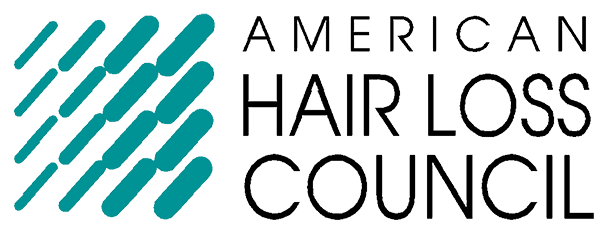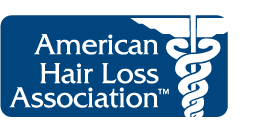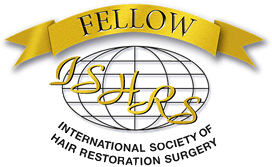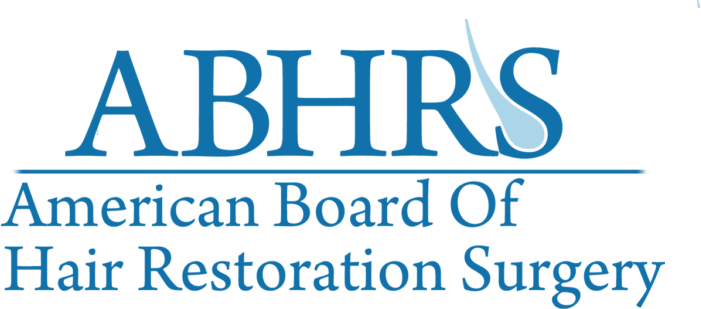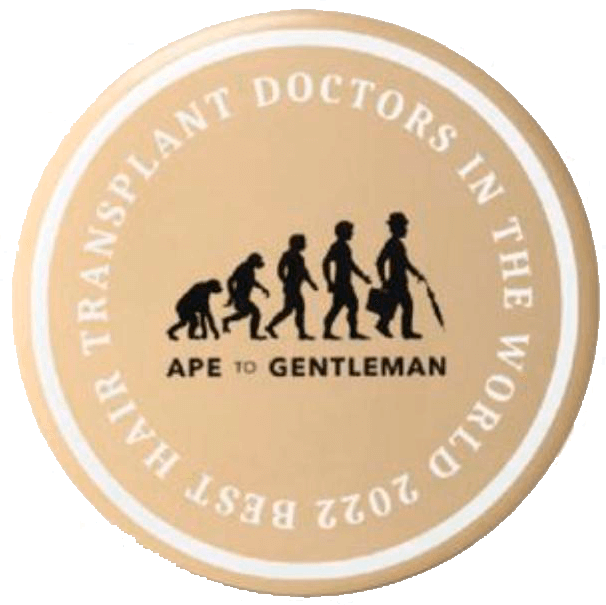What is Regenerative Medicine?
How Can Regenerative Medicine Help Those With Hair Loss & Alopecia?
Chicago September 2018 Boston Biolife Conference on Regenerative Medicine
Joseph Krieger – Founder, Boston Biolife
Alan J. Bauman, MD, ABHRS – Bauman Medical Hair Transplant & Hair Loss Treatment Center
Transcript:
[music]
[pause]
00:10 Dr. Alan Bauman: Hey, there. It’s Alan Bauman from Bauman Medical and we’re here in Chicago at Boston BioLife, and I’m here with the founder and director of the program, Joe Krieger, who started Boston BioLife how many years ago?
00:23 Joseph Krieger: It’s actually three years to this… Kinda around September. Our first meeting was in November, but we put the serious preparation into the Boston BioLife meeting at the American Academy of Physical Medicine and Rehabilitation.
00:36 Dr. Alan Bauman: And so what’s the whole point of this? Why are we here? What are we doing?
00:39 Joseph Krieger: Basically, we’re teaching physicians the biochemistry of medicine. And one of the corollaries for translational medicine is to bring scientist technology providers and healthcare providers together in one room. So that’s what they call translational medicine. They say it’s bench to bedside, but it’s really bringing the innovations of medical technology together with the innovations of life sciences. So as medicine has evolved and things have become less and less invasive, so open surgeries have become minimally invasive surgeries, things are done percutaneous now instead of open-heart surgery, you can do things through portals, etcetera. And it’s really no different in the next iteration, in that incisions are getting smaller, technologies are getting better, but now we’re actually healing the body on a cellular level.
01:25 Dr. Alan Bauman: Oh, yeah, telling the body to heal itself. And so regenerative medicine, that’s what it’s really all about, right? So whether we’re doing something aesthetic for hair, or something for pain, or whatever, there’s so many different applications.
01:36 Joseph Krieger: We’ve got sexual dysfunction, we’ve got aesthetics, we’ve got hair loss, we’ve got interventional pain management, we’ve got orthopedics, orthobiologics. So really every tissue type in the body has the ability to regrow or regenerate. What I think is beneficial for you being here and it’s also beneficial…
01:51 Dr. Alan Bauman: Yeah, why should we be?
01:52 Joseph Krieger: Well, because you’re gonna get a full spectrum exposure to all the biologics. This isn’t a one-size-fits-all, it’s not a panacea. We’ve got the biochemistry of blood, you’ve got adipose-derived biologics, you’ve got bone marrow aspirate, you’ve got perinatal biologics, which is coming out of a bottle. But they all fundamentally have similar characteristics: There’s cells, signals and scaffolds. That’s the trilogy, that’s the mirepoix, if you will, of regenerative medicine. You need those three constituents. So as cells signal other cells to behave in certain ways, and DNA is often regulated through the transcription of RNA, things regrow. So when we’re little, or babies, or embryos, we have every gene, but as we become more specialized or committed, those genes get turned off. So as we age, we rust. We carboxymethylate our DNA, we have oxidative stress and our systems change. And in order to detect, deter, defeat, we have to start turning these genes back on and trying to… There’s two constituents, one’s to turn back on and the other one’s to maintain some type of homeostasis, that’s the balance.
02:55 Dr. Alan Bauman: So that’s what we’re learning here. I’ve sat in on so many different lectures and seen so many new, interesting ways to affect the body, whether it be for all the different things that you’ve mentioned, aesthetics, or pain, ED, you name it. So it’s a really incredible conference. Why should people come to this conference? Who should come and why?
03:13 Joseph Krieger: Well, I think any healthcare practitioner that’s interested in the future of medicine, that wants to provide the best care for their patients, but also be on the leading edge. What we learn today and what we’ve learned in three years, this is our 20th course. I think we’ve had 1500 people come through this, and we’ve had people come five times, and we’ve had people come from all over the world. So as we expand our footprint and we communicate with the physician community, what happens is they learn from each other. So one of the essence of this is teachable medicine, not only learning what works but learning what doesn’t work. So as clinicians, we can become more connected, because we’ve never been more connected as a society than we are right now, and in two hours now, we’ll be even more connected.
03:51 Dr. Alan Bauman: Absolutely.
03:52 Joseph Krieger: But the point being is, people now have the ability to communicate with each other. Patients are actually more educated, social media has driven awareness, especially for all these novel technologies. So patients are gonna start educating their doctors. The problem with…
04:04 Dr. Alan Bauman: Yeah, they’re gonna start to demand these kinds of treatments and procedures because they don’t want old school pharmacologic interventions or invasive surgical procedures.
04:12 Joseph Krieger: Remember, 20 years ago, it was WebMD. Now everybody’s got a computer on their hands and everybody can search. But yeah, you have to be buyer beware and you have to be aware of what’s happening. But really, with minimal education and minimal difficulty, you can figure out what the next thing is.
04:28 Dr. Alan Bauman: So to wrap up, how would you summarize this meeting? I know we’re coming to the end of it. And what do you see for the future? What’s your plan for the next few?
04:35 Joseph Krieger: So we started off with pain management, remember I mentioned pain management. We started off with low back pain, degenerative disk disease, then we went to the full spectrum with the biologics, including spine. Now we’ve bolted on functional integrative wellness, and now we’re melding that with what’s called personalized precision medicine. So the N-of-1 care plan dictates that every patient is their own clinical trial. So when you say, “I am N-of-1, this is a campaign, this is my biology.” So having the ability to look at our unique situations and then tailor therapies to that.
05:05 Joseph Krieger: So really, the mission is to keep bringing the technology providers together, to bridge the gap between science and medicine, and to give the resources to the attendees, the healthcare providers and the faculty, and the technology providers so that their vision can be to evolve. Even since we’ve started this meeting three years ago, when we only had five vendors, now it’s 30 vendors, all of these companies have developed new technologies, all of our faculty have created new presentations, people are publishing as groups, there’s studies in journals, and things are happening. So to answer your question, I believe we’ll do one more of these by the end of the year, November, late November, early December, if the people want, and then next year it would be between four and six. But we also have an online academy where all of our presentations are archived. We’re doing webinars, live webinars and canned presentations so that people can go back and learn in their own capacity.
05:56 Dr. Alan Bauman: Great. So where can somebody go to check out that library of information?
06:00 Joseph Krieger: So bostonbiolife.com is our principal web page with information on our faculty vendors and our courses. But Boston BioLife Academy will be going live literally when we get home.
06:08 Dr. Alan Bauman: Great. Well, congratulations, really a great meeting. It was great to be, not only an exhibitor but also an attendee. Really enjoyed it. My staff enjoyed it. And we’ve gotten such great feedback from everybody who’s been here, so congratulations, good job, upward and onward.
06:20 Joseph Krieger: Well, thank you for taking the leap.
06:21 Dr. Alan Bauman: Hey, Joe, who knows?
06:21 Joseph Krieger: Since we met at the World Stem Cell Summit, we’ve done a lot of things.
06:23 Dr. Alan Bauman: That’s right.
06:23 Joseph Krieger: And now we’ve got the ability to create stem cells biologics for the clinical application of hair restoration.
06:28 Dr. Alan Bauman: Exactly.
06:29 Joseph Krieger: Not just using PRP, not just using…
06:31 Dr. Alan Bauman: Don’t let the cat out of the bag yet.
06:32 Joseph Krieger: Don’t let the cat out of the bag. There’s new things coming, so thank you very much for your help.
06:35 Dr. Alan Bauman: Alright, you’re welcome.
06:36 Joseph Krieger: Alright, I gotta go kick this ball off.
06:36 Dr. Alan Bauman: Alright.
[music]
If you or someone you know has hair loss, hair thinning, baldness, or eyebrow / eyelash concerns, click to start either a long-distance virtual consultation OR an in-person, in-office consultation with Dr. Bauman. You can also Ask Dr. Bauman a Question or simply call Bauman Medical Group at +1-
*Each individual's treatment and/or results may vary



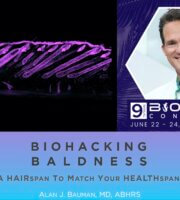 A Hairspan to Match Your Healthspan: Biohacking Baldness w. Dr. Alan Bauman
A Hairspan to Match Your Healthspan: Biohacking Baldness w. Dr. Alan Bauman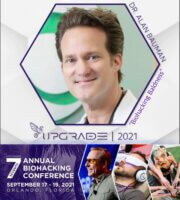 Dr Alan Bauman will be a featured speaker at the 7th Annual Biohacking Conference in Orlando
Dr Alan Bauman will be a featured speaker at the 7th Annual Biohacking Conference in Orlando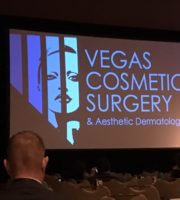 Internationally Recognized Hair Loss Expert Dr. Alan J. Bauman attends Vegas Cosmetic Surgery Show to Advise Fortune 500 Companies
Internationally Recognized Hair Loss Expert Dr. Alan J. Bauman attends Vegas Cosmetic Surgery Show to Advise Fortune 500 Companies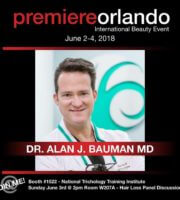 Top Hair Restoration Expert Dr. Alan J. Bauman Featured at 2018 Premiere Orlando Beauty Conference
Top Hair Restoration Expert Dr. Alan J. Bauman Featured at 2018 Premiere Orlando Beauty Conference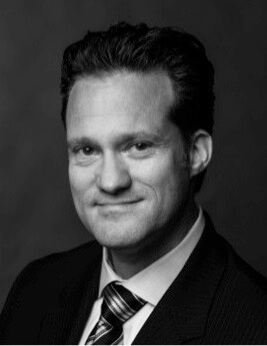 Dr. Alan J. Bauman, M.D.Hair Loss & Hair Transplant ExpertBoca Raton, FL
Dr. Alan J. Bauman, M.D.Hair Loss & Hair Transplant ExpertBoca Raton, FL